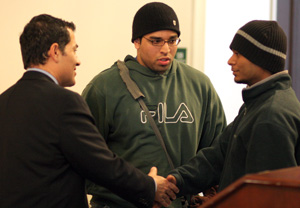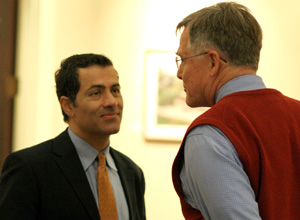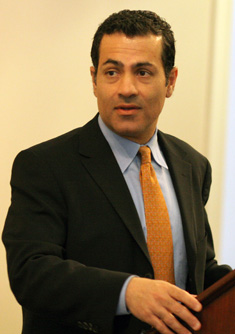Noted Islamic expert Vali Nasr spent Monday on the Wabash College campus discussing and explaining the complex issues of the region in ways that most anyone could understand.
 "There is hardly any one region that is less known to the United States than the Middle East," Nasr said. "And I'm not talking just talking about the people but the politicians."
"There is hardly any one region that is less known to the United States than the Middle East," Nasr said. "And I'm not talking just talking about the people but the politicians."
Nasr is a noted Iranian-born American scholar. He teaches at the naval postgraduate school in Monterey, Calif. He is considered an expert in Middle Eastern Affairs, Islam, and the area's politics. He is a frequent guest on many of the major television network news shows.
As a point of emphasis during his evening presentation, Nasr noted one journalist's poll of politicians and intelligence leaders which was recently reported in the New York Times and showed very few if any could even adequately explain the difference between Shia and Sunni Muslims.
At it's most simple level, Shias and Sunni Muslims had a disagreement 1,400 years ago determining the successor of Prophet Muhammad. The sects have fought since 632 A.D. over ideological and territorial differences.
"The Middle East has become by default the single most important region in the world," Nasr asserted during a noon luncheon. He noted the downfall of the Soviet Union and its military strength left the Middle East with its security challenges, economic strength through oil, and political instability as the United States' major world challenge.
 But the United States has problems understanding how to deal with the Middle East, largely because of a lack of understanding. He noted few political leaders understand the area's culture, history, and politics. He used the military as an example.
But the United States has problems understanding how to deal with the Middle East, largely because of a lack of understanding. He noted few political leaders understand the area's culture, history, and politics. He used the military as an example.
"The U.S. military is a war-fighting machine but what it's been transformed into is a political machine," Nasr said. He noted that military leaders have to act as mayors and negotiators in areas where they don't understand the religion and culture and virtually no U.S. military officials even speak the language - Arabic.
Nasr devoted much of his evening remarks to a packed Baxter Hall on the Iraq war. He said the United States major failure was not to bring democracy to all of Iraq but its failure to understand shattering the Iraq state would lead to sectarian upheaval between the Shias and Sunnis.
Most of the Muslim world is Sunni. Sunni Muslims rule many of the countries in the Middle East. Shias dominate in Iran and most of Iraq. Close ties and support of Iraqi Shias in the early years of the Iraq war gave the United States' traditional Arab allies no reason to support the war.
The U.S. shifted policy in 2005 trying to bring Sunnis into the political mix and offended the Shias who had been supportive, Nasr explained. The end result is no one trusts the United States.
"What the region saw was a change in the balance of power between the sects, Nasr said. "If you look at all the countries in the middle East most are ruled by minorities. What better point then than that the U.S. was intent on destroying Islam.
 "The single biggest issue out of our occupation is going to be the Sunni-Shia issue. We never came out and took a position. We had the backing of the Shia then in 2005 we backed away. We wanted to make everybody happy and that's not possible. Now, no country supports us. Our friends have no vested interest in our success and our enemy (Iran) has the most to gain by our success.
"The single biggest issue out of our occupation is going to be the Sunni-Shia issue. We never came out and took a position. We had the backing of the Shia then in 2005 we backed away. We wanted to make everybody happy and that's not possible. Now, no country supports us. Our friends have no vested interest in our success and our enemy (Iran) has the most to gain by our success.
"What we've done in is remove Iran's natural enemies, the Taliban in Afghanistan and Saddam in Iraq. We destroyed the one military (Iraq) that could stand up to Iran."
Nasr wasn't above a little humor in making his point, though a serious note. Many of the Shias' holiest sites are in Iraq. So when the U.S. deposed Saddam Hussein, Iranian Shias were able to visit the holy sites. More than a million visited last year boosting southern Iraq's economy.
"But when the U.S. talks of eliminating Iranian influence in Iraq it's like saying you're going to eliminate Italian influence at the Vatican."
Though he does advice President Bush on Middle Eastern matters, he noted the president's characterization that Muslims and many in the Middle East don't like Americans or our lifestyle is just wrong. He said deep-rooted displeasure with the policies of the United States and Britain is at the core of the hostility found in those areas.
Middle Eastern Muslims, Nasr said, have distrust of the West because of years of betrayal drawing borders and support for Israel.
Even resolution of the Palestinian-Israeli conflict wouldn't change things. "It's not a silver bullet. It would impact public opinion but it wouldn't resolve the Iraq problem or impact our relationship with Iran.
"When 9-11 happened the attitude in the Muslim world was the problem is U.S. policy." He said Saudis largely agreed with Osama Bin Ladin's view of the Palestinian-Israel problem but less than 10 percent of Saudi citizens would want him as a leader. Most viewed 9-11 as a payback for U.S. policies in the Mid-East, he said.
Nasr is the author of the bestseller The Shia Revival: How Conflicts within Islam will Shape the Future. He has written numerous other books. He is a 2006 Carnegie Scholar and has given expert testimony to the U.S. Senate.
In photos: Top right, Nasr talks with students after luncheon Q&A. At center left, Nasr talks with Political Science Professor Phil Mikesell. At lower right, Nasr talks about the Iraq War.